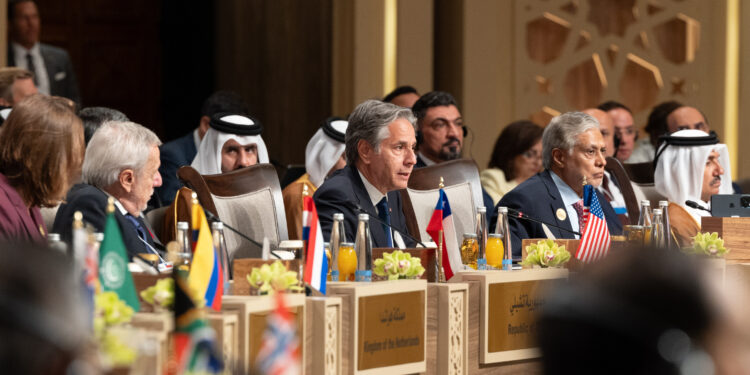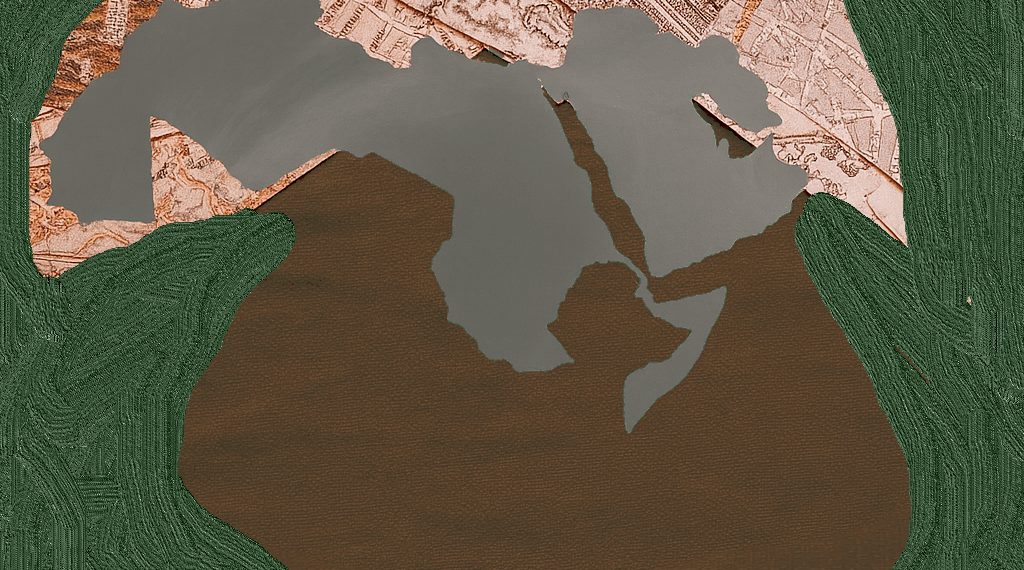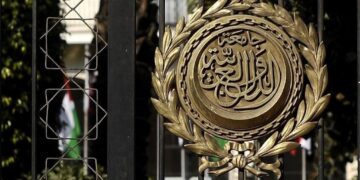Table of Contents
Sebastian Sons
The disastrous Gaza conflict has been going on for more than ten months following Hamas’ attacks on Israel on October 7, 2023. By August, more than 40,000 people are reported to be killed, up to 70% being women and children, and over 91,000 have been injured.
Ongoing negotiations about a substantial ceasefire and a release of Israeli hostages remaining captured by Hamas have not been fully successful yet. In addition, the violence in the Gaza Strip has spurred regional escalation and the risk of open warfare between the Israeli army on the one hand and Iran and the Lebanese Hezbollah is growing daily, while the Yemeni Houthis have been threatening international shipping in the Red Sea with drone and missile attacks for months. So far, the enmity between Israel and Iran is becoming increasingly open and has already been reflected in direct attacks in recent months and a spurred escalation indicated by the killing of Hamas’ political chief Ismael Haniyeh in Tehran or Hezbollah leader Fuad Shukr in Lebanon’s capital Beirut, the Israeli attacks in April on the Iranian consulate in Syria and the counter-strike by the Islamic Republic on Israel with more than 300 missiles and drones.
1. The Gulf states: No interest in regional escalation
So far, the most influential regional players have shown no interest in letting the conflict get out of control – they are too concerned of a spiral of violence that they would not be able to manage. These actors include the Arab Gulf states in particular. All of them find themselves in a delicate situation as they need to preserve national socio-economic interests, promote regional conflict management by engaging with rivals such as Iran, prevent further escalation in strategic theatres of power projection such as Yemen, Iraq, the Red Sea and the Horn of Africa, showcase pro-Palestinian solidarity and find a pragmatic modus operandi with Israel. In recent years, the Gulf region has entered a new dynamic towards enhanced reconciliation efforts in order to overcome tensions and mitigate conflicts.
In recent years, the Gulf region has entered a new dynamic towards enhanced reconciliation efforts in order to overcome tensions and mitigate conflicts
By establishing more transactional relationships based on mutual interest in specific policy files such as economic partnership or trade and investment, the respective governments are aiming at managing ideational tensions and rivalries. Therefore, they have pursued a strategy of regional de-escalation, risk minimization and tactical rapprochement towards regional foes such as Israel on the one hand and Iran on the other: In recent years, some GCC countires have promoted reconciliation with Israel and took a pragmatic course in light of growing security deterioration and economic interests towards Israel. This was particularly evident in the United Arab Emirates (UAE) and Bahrain, which normalized relations with Israel in 2020 as part of the so-called “Abraham Accords”. The then Israeli Minister of Infrastructure Uzi Landau had already traveled to the Emirates in 2010, and an Israeli representative office was opened in the UAE in 2015. In 1994, an Israeli minister traveled to Bahrain. Qatar, on the other hand, rejected normalization, but cooperated with Israel when it served its own interests. In the 2000s, the Qatari leadership initiated negotiations between Israel and Hamas. Oman was also cautious with regard to official recognition, but repeatedly sought an exchange with Israeli representatives from business and politics. As early as 1994, then Israeli Prime Minister Yitzhak Rabin traveled to Muscat and in 1996 Israel opened a trade mission in Oman. Kuwait, on the other hand, rigidly opposed greater Israeli integration into the Arab world. Finally, Saudi Arabia’s position towards Israel underwent significant transformations in recent years: an Israeli athlete took part in the triathlon in the Saudi kingdom in October 2022, an Israeli and Saudi judoka competed against each other during the 2021 Summer Olympics in Tokyo, and an Israeli team took part in the 2023 World Cup in e-football, which was held in Riyadh.
With regards to Iran, the Gulf states are also following different approaches: Whereas the kingdom’s foreign policymaking was mainly driven by a confrontational foreign policy approach until the end of 2018, the kingdom’s leadership under Crown Prince Muhammad bin Salman has since then shifted towards more pragmatism and regional dialogue. This became in particular evident in the Saudi policy towards the regional rival Iran: For instance, the drone and missile attacks on two Saudi oil refineries Abqaiq and Khurais in September 2019 underscored to the Saudi leadership its own vulnerability and the lack of US support as a security provider. In the aftermath, the kingdom intensified its diplomatic efforts by reaching out to Iran. After five rounds of direct talks between Iranian and Saudi security officialsthat started in 2020 and were facilitated by Iraq and Oman, in March 2023 both countries signed an agreement, facilitated by China, to restore diplomatic ties that were cut in 2016. Saudi Arabia considers tactical rapprochement with Iran as part of its own development policy: In order to achieve its economic goals, the Saudi leadership needs regional stability to attract foreign investors and establish Saudi Arabia (and the region) as an attractive and secure location for investment. In the case of Yemen, the Saudi leadership expects from Iran to exert pressure on the Houthis to stop their attacks on Saudi territory and find a political solution. Following the agreement, Iran’s late Foreign Minister Hussein Amirabdollahian and his Saudi counterpart Faisal bin Farhan met for the first time in April 2023 for an exchange in Beijing and again two months later in Tehran before the Saudi Crown Prince Muhammad bin Salman received Amirabdollahian in Jeddah in August 2023. Saudi officials also continued this high-ranking diplomatic exchange after Iran’s President Ebrahim Raissi and Amirabdollahian were killed in a helicopter accident in May. For instance, Vice Minister of Foreign Affairs, Waleed al-Khereiji, and other Saudi officials attended the inauguration of Raissi’s successor, Masoud Pezeshkian, in Tehran. Bahrain is also seeking rapprochement with Iran, although the Islamic Republic is perceived by the Bahraini rulers as a threat to their own power. For Oman, Kuwait, and Qatar, relations with Iran are historically mainly driven by pragmatism and non-confrontation rather than by demonization and Iranoia.
2. The motivations behind regional reconciliation: Preserving the Gulf business model
Such rapprochement processes are no coincidence: In the geopolitical context, the Gulf countries find themselves in a ‘regional security complex’ that is characterized by several regional conflicts and crises such as the hegemonic rivalry between Saudi Arabia and Iran which intensified after the Iranian Revolution 1979, the US invasion in Iraq 2003 as well as the rise of terrorist movements such as Al-Qaeda and Da’esh and the implications of the “Arab Uprisings” 2010/2011 that led to turmoil in Egypt and Tunisia and to military conflicts and civil wars in Libya, Yemen, and Syria. In a multipolar world, thus, the Gulf states are following a balancing approach towards global powers such as China and Russia on the one hand, and the US and Europe on the other hand. This balancing act is driven by the motivation to promote national interests, a growing reluctance to take sides and promoting non-alignment. Growing mistrust in the credibility of the ‘West’, in particular the US, as a reliable security partner shapes the public and political discourse across wide parts of the Gulf region: The ‘West’ is perceived in broad terms as a neo-colonial actor driven by double standards, a lack of respect, and value-oriented motives that neglect key Gulf security concerns (for instance, Iran). As a consequence, the Gulf monarchies are self-confidentially developing their own partnership model, which is based on pragmatic and opportunistic diversification, regional rapprochement and multi-alignment. Against this backdrop, the rulers in the Gulf have realized that animosities and tensions damage their own reputation and business models. As foreign investment and the diversification of revenues constitute key pillars of their respective plans for economic development, preserving regional stability has become a geostrategic priority when it comes to consolidating their political power. In Saudi Arabia, “Vision 2030”, introduced in 2016, also aims to transform the oil-based economy into a multi-sectoral knowledge economy by investing into digital infrastructure, the property, tourism, entertainment, logistics, healthcare, renewable energy and sports. The other GCC countries are undergoing similarly complex and complicated processes. The “Qatar National Vision 2030” and the “Bahrain Economic Vision 2030” were already published in 2008, followed by the “UAE Vision 2030” in 2010, the revised Vision 2035 “New Kuwait” in 2017 and the “Vision 2040” in Oman in 2020. The goals are clear: only by diversifying the economy can the royal family succeed in reducing youth unemployment and retaining political power. Even though they are competing for investors and market access in many respects and face different challenges, they are united by one pillar: Without regional stability there can be no national progress and without national progress there can be no political survival. In times of economic diversification, all Gulf states are pushing for close integration into the global financial and economic system, investing in foreign markets and striving for global attention. In this regard, foreign, economic and domestic strategic considerations and motivations in the Gulf cannot be separated from each other but are closely interwoven. Development in all areas has thus emerged as the top political priority and is also reflected in foreign policy. The more the situation in the Red Sea spirals out of control, the more the geostrategic connectivity interests of the UAE, which sees itself as the “new Venice” and has long since built up a maritime network through its involvement in African, Arab, Asian and European ports, are jeopardized.
The Gaza conflict and the associated worst case scenario of a regional escalation threaten the business interests and political power calculations of Gulf rulers
For Saudi Arabia, it is essential that foreign investment flows into the country in order to realize its gigantic plans and giga projects such as NEOM at the shores of the Red Sea. Unrest in the immediate neighborhood is detrimental to this plan, as the kingdom’s status as a safe investment location could suffer. Until 2022, the Houthis repeatedly attacked Saudi targets. Although this danger currently seems to have been averted, such strikes could flare up again. Should there be an open war between Israel and Hezbollah, attacks from Lebanon could also be directed against targets in Saudi Arabia. After all, Hezbollah has an arsenal of around 130,000 missiles.
As an important exporter and producer of natural gas, Qatar is also dependent on free trade routes, shares the world’s largest gas field with Iran and therefore also shows no interest in a permanent regional crisis. Against this backdrop, the Gaza conflict and the associated worst case scenario of a regional escalation threaten the business interests and political power calculations of Gulf rulers. After the killing of Haniyeh in July, all Gulf leaderships thus harshly criticized Israel for its alleged attack on Tehran. For instance, the assassination was blamed as “a criminally irresponsible act committed by Israel” by Kuwait, a “blatant violation of international and humanitarian law” by Kuwait and Saudi Arabia, and a “heinous attack” by the Organization of Islamic Cooperation (OIC). The Saudi Foreign Minister Faisal bin Farhan Al Saud also calledfor sanctions against Israel.
3. Saudi Arabia: Balancing Responsibility for Gaza with Potential Normalization with Israel
For these reasons, all Gulf states are attempting to contain and manage the conflict in different ways: Saudi Arabia has presented itself as a regional leader since the beginning of the Gaza conflict, championing the Palestinian cause and harshly criticizing Israel. Representatives of the Saudi government refer to the Arab Peace Initiative of 2002, which was largely initiated by then Saudi King Abdullah and formulates a two-state solution as its goal. The kingdom wants to present itself as a supporter of the Palestinians; after all, Saudi Arabia also bears moral and religious responsibility for Palestine as the ‘Custodian of the two Holy Sites’ Mecca and Medina, after this crisis had lost relevance in Saudi Arabia for years. The kingdom also holds a trump card in its hands: Although the negotiations with the US and Israel on a possible normalization of relations with Israel were suspended after October 7th, they are being strategically smartly instrumentalized by the Saudi leadership to strengthen its own negotiating position. From a Saudi perspective, the price for such a rapprochement has risen: While Saudi Arabia demanded far-reaching security guarantees from the US as basic conditions for a possible normalization with Israel, as well as permission to build its own nuclear program, the creation of a Palestinian state is now prominently demanded. This seems unattainable with Israel’s Prime Minister Benjamin Netanyahu. Riyadh could therefore rely on the time factor before serious talks with Israel – possibly with a successor to Netanyahu – are resumed. Whether this will be with the involvement of the Biden administration also appears questionable in light of the upcoming US presidential elections in November. A new US President Trump could change the situation once again, which could potentially play into Saudi Arabia’s hands.
4. The UAE in Light of the “Abraham Accords”: Leverage and Burden
The UAE gave away this trump card when it signed the so-called “Abraham Accords” in 2020. As of today, the calculation of exerting pressure on the Israeli government to accept a two-state solution by diplomatic means turned out to be illusory. As a result, Abu Dhabi finds itself now in a dilemma: on the one hand, the Emirati business model is benefiting from the strengthening of trade relations with Israel. Two years after the agreement, the trade volume between the UAE and Israel stood at USD 2.5 billion, a bilateral free trade agreement came into force in March 2023, and 1,000 Israeli companies were active in the UAE in 2023. On the other hand, the “Abraham Accords” are also damaging the political legitimacy of the Emirati leadership: in a survey conducted in January 2024, 67% of respondents were critical of the UAE’s role in the Gaza conflict. In any case, the Emirates have not yet succeeded in using their diplomatic channels with Israel to de-escalate the situation. On the other hand, a termination of the Abraham Accords is also not being seriously considered, as the rulers in Abu Dhabi expect strategic depth and economic returns from this deal in the long term. The “Abraham Accords” provide the UAE with channels of communication to the Israeli government other regional players are lacking. For instance, Abdullah bin Zayed Al Nahyan invited Brett McGurk, the US Middle East advisor, Tom Sullivan, the US State Department advisor, and Ron Dermer, the Israeli Minister of Strategic Affairs, to discuss chances for a post-conflict scenario in a July meeting in Abu Dhabi.
5. Qatar: Reconsidering its Role as a Mediator in Light of Growing Criticism
Most recently, Qatar, has come to the attention of the world as a mediator between the Israeli government and Hamas. Since 2012, the Qatari leadership has maintained conciliatory relations with parts of the Islamist movement and Hamas representatives such as Ismail Haniyeh lived in Doha. Qatar mediated in the Middle East conflict in 2006, 2009 and 2014and has since expanded its influence as an influential networker and negotiator. This became evident, for instance, in the negotiations between the United States and the Taliban that took place in Doha in 2020. After the US and other allies withdrew from Afghanistan in 2021, Qatar made it possible for 58,000 refugees to evacuate the country after the Taliban takeover, and also provided necessary support to the country after evacuations. The Taliban already opened a liaison office in Doha in 2012. Despite its small demographic and geographic size, Qatar thus considers itself as an influential “Middle Power” in the international arena indicated by growing self-awareness and independence in a multipolar world. As a player with strong political and sometimes economic ties to different parties – Iran and the US, Hamas and the Taliban, China and Europe – it attempts to stave off external threats in a world full of crises, avoiding “mono-reliance” on a few partners. This pragmatic approach of soft power and public diplomacy is customarily seen as a protective shield in a fragile region in which Qatar is constantly threatened by regional rivals. Since October 7th, Qatar’s prominent role as a mediator, platform and facilitator in regional conflicts has become even more obvious. This has enabled the small emirate to consolidate its relevance as a hyperactive networker on the world stage. In this regard, Qatar has hosted regular negotiation rounds in Doha whose participants include David Barnea, director of Mossad, Israel’s secret service, as well as by his US counterpart, CIA director William Burns. In July, Qatar together with Egypt and the US called on Israel and Hamas to resume talks to reach a ceasefire in the Gaza Strip. A few weeks later, Qatar hosted another round of negotiations on a ceasefire and hostage release deal in the Gaza Strip. Referring to such de-escalation efforts, many representatives of the international community, such as US president Joe Biden and German foreign affairs minister Annalena Baerbock, have thanked Qatar for its constructive involvement in the negotiations between Hamas and Israel.
However, Qatar is now being criticized for its proximity to Hamas and is suspected of having supported terrorist structures. After all, Qatar is said to have provided around USD 2 billion in financial support to Hamas since 2007 and 30 million per year for the payment of salaries in Gaza. A letter signed by 63 Democrats and 50 Republicans in the US demands that the US government should exert more pressure on Qatar to expel Hamas leaders. Furthermore, Senator Ted Budd (R-NC) introduced a resolution to consider terminating Qatar’s status as a Major non-NATO Ally. Qatari representatives deny any explicit support for Hamas, however, and outlined that the country’s involvement in Gaza has always been coordinated with the US and overseen by Israel. Furthermore, Qatar has provided humanitarian assistance to Gaza prior to and since the beginning of the conflict through its donor organizations and implementing agencies such as Qatar Charity and the philanthropic charity Education Above All (EAA). In doing so, the Qatari leadership intends not only to show solidarity with the Palestinian victims of the war, but also to signal to the international community that it continues to be a reliable partner. On the multilateral level, Qatar has also provided financial assistance to UN organizations: In 2022, Qatar supported UNRWA with a total of USD 10.5 million and in March 2024, Qatar pledged USD 25 million to UNRWA. In light of such accusations, Qatar has to consider how high the price may be for its policy of talking to Hamas, as Qatar’s Foreign Minister Mohammed bin Abdul Rahman Al Thani stated: “We are now at this stage to evaluate mediation and also evaluate how the parties engage in this mediation.” In particular, after the killing of Haniyeh who lived in Doha for years and enjoyed close contact to the Qatari ruling elite, the leadership has to reassess its approach towards Hamas in terms of liability and reputational risks.
6. In Need of a Unified Approach: Perspectives and Challenges for Gulf Conflict Resolution
Until now, Saudi Arabia, the UAE and Qatar have attempted to manage and de-escalate the Gaza conflict in order to achieve national goals. However, this approach falls short. Instead, a partnership-based approach is needed. Representatives from Qatar, Saudi Arabia, Egypt and the US meet regularly to discuss conflict solutions. The Arab side in particular is increasing the pressure on the US government to work vehemently for a ceasefire with the Israeli government led by Prime Minister Benjamin Netanyahu. The Gulf states are concerned about the fate of the population in the Gaza Strip, whose suffering has increased immeasurably as a result of Israel’s attacks. Furthermore, the Gulf leaderships also fear an economic crisis and a massive loss of confidence on the part of global investors. Therefore, a long-term approach is needed to not only manage the Gaza conflict, but to resolve it permanently and prepare for the “day after” scenario.
Even before October 7th, the Saudi side had repeatedly pointed out that normalization with Israel was only an option if the Palestinian issue was adequately resolved
Saudi Arabia, in particular, has a key role to play here: traditionally, supporting Palestine is part of the Saudi identity; a Saudi fundraising campaign for Gaza had raised more than USD 165 million by January, and the Kingdom is providing substantial aid to Gaza. Definitely, pending normalization with Israel provides Saudi Arabia a tactical instrument to exert more pressure on the US and Israel’s government. For Saudi Arabia, a possible normalization with Israel was and is an option, but not a necessity. Even before October 7th, the Saudi side had repeatedly pointed out that normalization with Israel was only an option if the Palestinian issue was adequately resolved. Muhammad bin Salman made this clear, for example, in his Fox interview in September 2023 – and thus before the start of the Gaza war. Saudi Arabia can influence the situation in the Middle East more than ever before, but this also increases its responsibility to engage constructively and actively in conflict resolution. This situation presents risks, but also opportunities: if Muhammad bin Salman actually succeeds in achieving real progress for the Palestinians, he could consolidate his status as the undisputed leader of the Arab world. Next to Saudi Arabia, Qatar can support mediation efforts through its own networks, but it cannot dominate the process. Instead, Qatar could serve as a platform for future negotiations, cementing its status as a neutral arbiter. Finally, the UAE could use their diplomatic capital to the Israeli government in a more targeted manner than before.
In general, the Gulf states have established the necessary networks with various conflict parties and international players to initiate dialogue and work towards a post-war scenario. In March 2024, the Gulf Cooperation Council (GCC), to which the six Gulf states belong, presented a joint vision for regional security for the first time in its 43-year history. This explicitly calls for the implementation of a two-state solution based on the Arab Peace Initiative in order to achieve a just solution to the Palestinian question. In concrete terms, Saudi Arabia, Egypt, Jordan, Qatar, the UAE and the US already discussed in February a plan that envisages the creation of a Palestinian state and a ceasefire lasting at least six weeks. Only then could recognition of Israel be possible, as Saudi officials repeatedly emphasize. In such a scenario, security forces of the Palestinian Authority (PA) could be trained by Arab states after the end of the war in order to strengthen the PA under a technocratic leadership as the most important Palestinian actor, while Hamas loses power. In a nutshell, most of the Gulf monarchies – despite different status of relationships with Israel – are demanding the full withdrawal of Israeli troops from Gaza, a permanent seize fire, Palestinian self-governance, and a clear and consistent road map to achieve a two-state solution. From the UAE, concrete suggestions have been formulated as indicated by the statements of Lana Nusseibeh, the UAE Assistant Minister of Foreign Affairs and International Cooperation for Political Affairs, in the Financial Times in July. In her article, she expressed the option to form a “temporary international mission” in Gaza that should deal effectively with the humanitarian crisis and prepare the conditions for a Palestinian authority that gains control over the West Bank and Gaza. Some days later, also Minister of State for International Cooperation Reem Al Hashimi reiterated this vision officially. In this context, the Arab League called for a United Nations peacekeeping force to be deployed in the Gaza Strip and the Israeli-occupied West Bank until a two-state solution can be negotiated.
So far, however, these ideas are not fully developed, are strictly rejected by the Netanyahu government and require a significant restructuring of the dysfunctional PA. In particular, the outlined vision by UAE officials requires Israeli approval which seems rather unlikely under the current Israeli government. Furthermore, it is completely unclear who will lead the PA in the future, so internal power struggles are to be expected. Additionally, the Gulf states have not succeeded in coordinating their approaches and developing concrete strategies for a post-war Gaza. For example, they refuse to contribute to the gigantic costs of at least USD 20 billion for reconstruction. In this regard, UAE Minister of Foreign Affairs and International Cooperation Abdullah bin Zayed Al Nahyan emphasized that “the UAE refuses to be drawn into any plan aimed at providing cover for the Israeli presence in the Gaza Strip.” Although they have repeatedly promised comprehensive aid for Gaza in the past, the majority of these promises have not been kept; at present, they do not want to pay for the damage caused by Israel and consider aid to be inefficient if Israel threatens similar destruction in the future. Without political security guarantees and a roadmap for a two-state solution, Gulf Arab support therefore seems unrealistic.
7. The Way Forward: Military Securitization, Transactional Partnership, and Economic Diversification
In light of growing open escalation between Iran and Israel, all Gulf states are concerned about national and regional security. Against this backdrop, countries such as Saudi Arabia have started to invest more comprehensively into a local military industry to protect airspace and maritime zones, and develop their drone and surveillance technology. At the same time, they are seeking for diversified military and security partnerships. Despite the fact that the US remain the most relevant defense partner, more agreements with Turkey, China or France have been signed. In times of growing regional tensions, such trend is likely to continue. Furthermore, in light of confrontation between Israel and Iran, the interconnectedness of security threats across borders have become evident. As a consequence, the GCC countries aim to improve their mutual defense capabilities by organizing joint military exercises, shared intelligence platforms, and integrated defense structures. Furthermore, the Gulf leaderships will remain committed to transactional, limited mini-lateral agreements with partners of choice when it comes to coordination and cooperation. In a multipolar world order, they want to avoid siding with respective camps to keep all options open and achieve their national interests. Finally, economic diversification requires regional stability. As most of the Gulf states find themselves into a complex socio-economic transformation, they will show further interest to conflict management and de-escalation in order to preserve their business models.
Dr Sebastian Sons is a senior researcher at the Bonn-based Centre for Applied Research with the Orient (CARPO) and an expert on the Arab Gulf states. He was awarded his PhD on labour migration from Pakistan to Saudi Arabia and is author of three books on the Arab Gulf monarchies with a particular focus on Gulf-European and Gulf-German relations.







